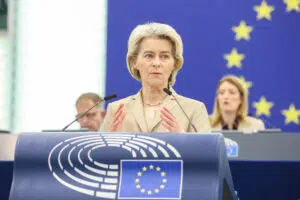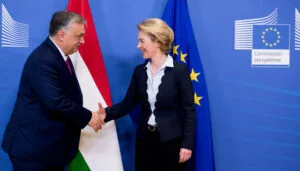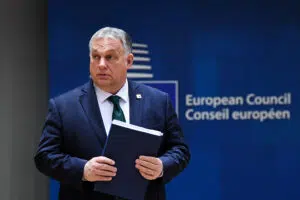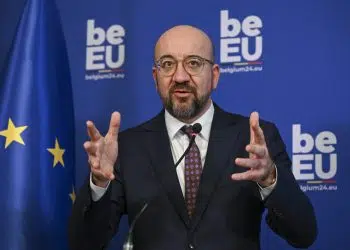Brussels – It is the week of the European Parliament’s big offensive
against Viktor Orbán‘s Hungary, but not only: The MEPs—called tomorrow
(Jan. 18) to vote on the long-awaited resolution on the “situation in
Hungary and unfrozen EU funds”—are also and above all accusing not too
covertly the other two EU institutions of not serving the European Union’s
economic and value interests. “The introduction of the rule of law mechanism was a great success, but we want factual checks and explanations on the unlocking of the EU funds,” summed up the chairman of the European People’s Party (EPP), Manfred Weber, in his speech this morning (Jan. 17) at the plenary session of the European Parliament.

The plenary session was also attended by the President of the European Commission, Ursula von der Leyen, under pressure from MEPs for the decision to unfreeze €10.2 billion in EU funds for Hungary in mid-December, right at the European Council where Prime Minister Orbán held hostage both the start of EU accession negotiations for Ukraine (subsequently unlocked) and the revision of the Multiannual Financial Framework with the €50 billion Kyiv Support Facility. “When we took office, we promised to safeguard the rule of law in the Union, while being fair to all member countries,” claimed the number one EU executive. To get part of the cohesion, fisheries and home affairs policy funds unfrozen, “Hungary has passed a new law on justice reform that responds to a number of our recommendations,” i.e., “what was needed to meet the required conditions.” Chairwoman von der Leyen also recalled that “the commissioners informed Parliament in advance” (albeit only a month before the release the response had not seemed so positive) and especially that “about €20 billion remains blocked” due to “concerns about Lgbtq+ rights, academic freedom, and asylum rights” and the rule of law conditionality mechanism.
For the Strasbourg Chamber, von der Leyen’s defence argument was not at all satisfactory, so much so that the EPP president (from the same political family as the commission’s number one), recalled that she had sent a letter to the president of the EU Parliament, Roberta Metsola, to urge the commissioners for the Budget, Johannes Hahn, and for Justice, Didier Reynders, to “provide us with explanations.” The point was emphasized by Pedro Marques, vice president of
the Progressive Alliance of Socialists and Democrats (S&D), who said,
“We are giving in to Orbán’s blackmail and all the European autocrats are
rubbing their hands.” Meanwhile, Malik Azmani, interim president of the
Renew Europe group, referred to the agreement reached by European Parliament
negotiators regarding the inclusion, in the resolution that will be voted on
tomorrow, of the item on initiating the process to file a lawsuit against the
commission before the EU Court of Justice. “Giving in to Orbán’s blackmail is a practice that we must stop now because it opens the door to further blackmail,” he was echoed by his colleague and former Belgian prime minister Guy Verhofstadt.

From left: the Prime Minister of Hungary, Viktor Orbán, and the President of the European Commission, Ursula von der Leyen
But what the EU Parliament is pushing hardest on is another way to inhibit the blackmail capabilities of Orbán’s Hungary: the use of Article 7 of the Treaty on European Union. This is the mechanism that allows the suspension of EU membership rights in the event of a “serious and persistent” violation of the founding principles of the Union by a member country which, in Hungary’s case, has a long history in the European Parliament. With the resolution of September 12, 2018, MEPs already in the previous legislature had requested the Council to assess violations of the rule of law in Budapest, since it is within its competence to deliberate with a four-fifths majority (the member country in question would not participate in the vote). After receiving the letters submitted by more than 120 MEPs calling for the use of Article 7, President Metsola let the press know that “I will meet with MEPs to see what to do.” The procedure was cited by almost all group leaders supporting the von der Leyen cabinet, and even the co-chair of the Green/Ale group, Terry Reintke, made it clear that “Article 7 is the only way forward in the battle between democracy and autocracy,” attacking the council for “doing nothing” in the past five years.
EU funds frozen and unfrozen for Hungary
According to the more accurate data provided in May 2023 from the commission services, the EU funds for Hungary frozen by Brussels stood at 28.6 billion euros, divided into three macro-areas: National Recovery and Resilience Plan (5.8 billion), Cohesion Policy Funds (22.6 billion) and Home Affairs Funds (223 million). The three paths proceed in parallel, each with a specific procedure (or several, depending on the nature of the funding). The first considers the “27 super-objectives” on the rule of law established on November 30 last year by the commission to release Hungary’s NRRP funds or 5.8 billion in grants. What is expected from Budapest is the judicial independence to be strengthened, so that judges’ decisions will be “protected from outside political interference.”
 The second chapter—the most complex—is about the cohesion policy funds, which for Hungary are worth 22.6 billion euros as funding from the EU budget. Of these funds, 6.3 billion were frozen through the rule of law conditionality mechanism by a council decision in December 2022 (and remain frozen). This is a separate procedure involving 55 per cent of the funds allocated to Hungary from three operational programs financed by the European Regional Development Fund (ERDF), the Cohesion Fund, the Just Transition Fund (JTF), and the European Social Fund Plus (ESF+): “Environment and Energy Efficiency Plus”, “Integrated Transport Plus”, and “Spatial and Settlement Development Plus”.
The second chapter—the most complex—is about the cohesion policy funds, which for Hungary are worth 22.6 billion euros as funding from the EU budget. Of these funds, 6.3 billion were frozen through the rule of law conditionality mechanism by a council decision in December 2022 (and remain frozen). This is a separate procedure involving 55 per cent of the funds allocated to Hungary from three operational programs financed by the European Regional Development Fund (ERDF), the Cohesion Fund, the Just Transition Fund (JTF), and the European Social Fund Plus (ESF+): “Environment and Energy Efficiency Plus”, “Integrated Transport Plus”, and “Spatial and Settlement Development Plus”.
Of the remaining 16.3 billion, 12.9 billion were tied only to the implementation of judicial reforms (without additional criteria) and these are the ones that were partly unblocked by Brussels after the review request. The remaining 3.4 billion are blocked for non-compliance with horizontal enabling conditions—that is, the necessary conditions as far as the EU Charter of Fundamental Rights is concerned—in three disputes between the commission and Hungary: the “child protection” law (the anti-Lgbtq+ law), the academic independence law, and the treatment reserved for asylum seekers law. The first issue is responsible for stalling 3 per cent of the cohesion policy budget (i.e., 678 million), the second by 9 per cent (over 2 billion), and the third by an additional 3 per cent (another 678 million). To unlock these funds it is not enough to put an end to the issues related to the independence of the judiciary (although it remains a pre-requisite for all of these) since the pending issues regarding the other horizontal enabling conditions must also be resolved.

The Prime Minister of Hungary, Viktor Orbán
Finally, there is the last issue to consider, that of the 223.1 million from three Home Affairs Funds programmes. As Eunews learned in February 2023 from sources inside the EU executive—and then confirmed again in mid-November—they are 69.8 million from the Asylum, Migration and Integration Fund (AMIF), 102.8 from the Border Management and Visa Instrument (BMVI) and 50.5 from the Internal Security Fund (ISF). Although the commission’s lack of transparency makes it complex to figure out exactly which funds have been unfrozen, sources close to the dossier report that it would be both Isf and Bmvi funds (tied exclusively to judicial matters according to implementation decisions), as well as Amif funds linked to access to asylum (integration) while those linked to non-refoulement (returns) would remain blocked.
English version by the Translation Service of Withub








